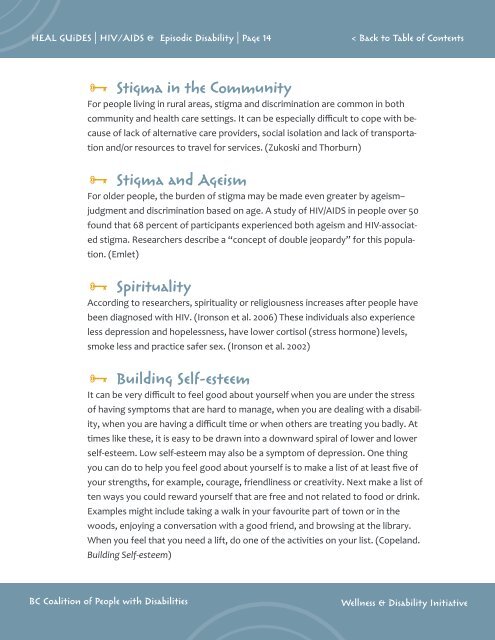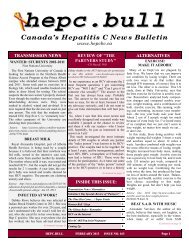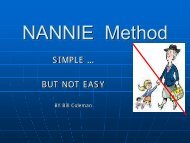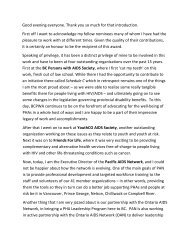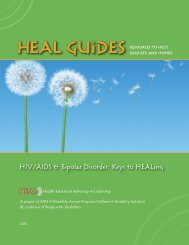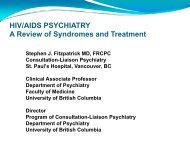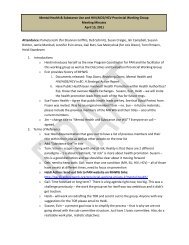HIV/AIDS & Episodic Disability: Keys to HEALing - bccpd
HIV/AIDS & Episodic Disability: Keys to HEALing - bccpd
HIV/AIDS & Episodic Disability: Keys to HEALing - bccpd
You also want an ePaper? Increase the reach of your titles
YUMPU automatically turns print PDFs into web optimized ePapers that Google loves.
HEAL Guides | <strong>HIV</strong>/<strong>AIDS</strong> & <strong>Episodic</strong> <strong>Disability</strong> | Page 14<br />
< Back <strong>to</strong> Table of Contents<br />
³³Stigma in the Community<br />
For people living in rural areas, stigma and discrimination are common in both<br />
community and health care settings. It can be especially difficult <strong>to</strong> cope with because<br />
of lack of alternative care providers, social isolation and lack of transportation<br />
and/or resources <strong>to</strong> travel for services. (Zukoski and Thorburn)<br />
³³Stigma and Ageism<br />
For older people, the burden of stigma may be made even greater by ageism–<br />
judgment and discrimination based on age. A study of <strong>HIV</strong>/<strong>AIDS</strong> in people over 50<br />
found that 68 percent of participants experienced both ageism and <strong>HIV</strong>-associated<br />
stigma. Researchers describe a “concept of double jeopardy” for this population.<br />
(Emlet)<br />
³³Spirituality<br />
According <strong>to</strong> researchers, spirituality or religiousness increases after people have<br />
been diagnosed with <strong>HIV</strong>. (Ironson et al. 2006) These individuals also experience<br />
less depression and hopelessness, have lower cortisol (stress hormone) levels,<br />
smoke less and practice safer sex. (Ironson et al. 2002)<br />
³³Building Self-esteem<br />
It can be very difficult <strong>to</strong> feel good about yourself when you are under the stress<br />
of having symp<strong>to</strong>ms that are hard <strong>to</strong> manage, when you are dealing with a disability,<br />
when you are having a difficult time or when others are treating you badly. At<br />
times like these, it is easy <strong>to</strong> be drawn in<strong>to</strong> a downward spiral of lower and lower<br />
self-esteem. Low self-esteem may also be a symp<strong>to</strong>m of depression. One thing<br />
you can do <strong>to</strong> help you feel good about yourself is <strong>to</strong> make a list of at least five of<br />
your strengths, for example, courage, friendliness or creativity. Next make a list of<br />
ten ways you could reward yourself that are free and not related <strong>to</strong> food or drink.<br />
Examples might include taking a walk in your favourite part of <strong>to</strong>wn or in the<br />
woods, enjoying a conversation with a good friend, and browsing at the library.<br />
When you feel that you need a lift, do one of the activities on your list. (Copeland.<br />
Building Self-esteem)<br />
BC Coalition of People with Disabilities<br />
Wellness & <strong>Disability</strong> Initiative


